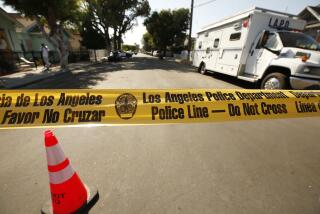E-Mail Says Animal Group Behind Blast
An anonymous e-mail released Tuesday claimed that a militant group is responsible for a second bombing in the Bay Area and threatened an even larger explosion.
“No more will all of the killing be done by the oppressors, now the oppressed will strike back,” stated the e-mail, purportedly written by Revolutionary Cells, which says it fights for animal rights and the environment. “We will be non-violent when ... these people are non-violent to the animal nations.”
The statement was met with concern from law enforcement officials, who are investigating two bombs that exploded in August at Emeryville biotech firm Chiron and another bomb that went off last week outside the Shaklee Corp., a Pleasanton cosmetics and vitamin company.
“This is a serious escalation,” said San Francisco FBI spokeswoman LaRae Quy. “And it is only a matter of time before somebody is killed.”
One radical environmental group condemned the threat of violence against humans.
“I’ve never seen anything like this before,” said Kevin Jonas, spokesman for Stop Huntingdon Animal Cruelty, which has vandalized and sent threatening notes to employees and associates of a British animal testing lab.
“This isn’t the Animal Liberation Front anymore. They’re not stealing a dog.... These are people beyond our control.”
The message was posted on the Internet by Bite Back magazine, the de facto press office for radical animal rights activists.
The e-mail described a “10lb ammonium nitrate bomb strapped with nails” that was allegedly left at the Shaklee building -- a description that authorities have not released and would not confirm as true.
“We will now be doubling the size of every device we make,” the message stated.
Quy said she would not know the bomb’s composition until the FBI’s forensics laboratory in Quantico, Va., had finished analyzing the debris and other arson evidence. But based on the e-mail and other undisclosed evidence, she said, the FBI had opened a domestic terrorism investigation related to the Shaklee case.
She noted that Tuesday’s Web posting was similar to the communication sent out after the Chiron bombing.
Quy said that both the Emeryville and Pleasanton explosions show that animal rights’ extremists are using “bigger” bombs that could be deadly, not just cause property damage. In Emeryville, investigators found two separate explosive devices that went off almost an hour apart -- the first igniting the blaze, the second exploding when the property was consumed by fire before the arrival of bomb technicians.
“In the Chiron bombing, if the first responders would have arrived minutes earlier, people would have been killed,” Quy said. “That’s a fact.”
Given the threats contained in the e-mail, Quy said, any future attack linked to the animal rights’ extremists also could carry far more punishment because any injuries or deaths might no longer be viewed as an unintended accident.
The message said Shaklee was targeted because its parent company, Yamanouchi, was a client of Huntingdon Life Sciences, which does animal testing.
Officials at Shaklee and Yamanouchi declined to comment.
Huntingdon spokesman Mike Caulfield said, attempt by radicals to harass and intimidate, through violence, anyone who does not agree with their anti-research agenda.”
Bite Back magazine received the e-mail late Monday through a private animal activist list-serve, said editor Nick Atwood. He and others familiar with animal and environmental activism said Revolution Cells was an unknown group before the two bombings.
Atwood added that the only other instance of an animal rights or environmental group detonating homemade bombs occurred in 1997, when six pipe bombs hit the Fur Breeders Agricultural Coop in Utah.
By expressing sympathy for an array of causes including Palestinian rights, the Irish Republican Army and anti-globalization, “this organization seems to have a more unilateral approach to social and political justice,” said Craig Rosebraugh, a former spokesman for the Earth Liberation Front who said he approves of violence to advance a cause. “They’re also concerned with environmental destruction and stopping human rights abuses.”
Opponents of environmental and animal radicals condemned the bombing and threat.
“We have seen a progression of violence within the eco-terrorism,” said Kelly Stoner, executive director of Stop Eco-Violence.
Times staff writers Chong and Krikorian reported from Los Angeles; correspondent Pogash reported from San Francisco.
More to Read
Sign up for Essential California
The most important California stories and recommendations in your inbox every morning.
You may occasionally receive promotional content from the Los Angeles Times.










